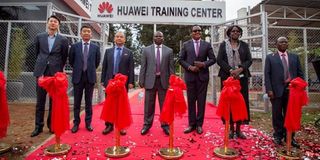Huawei opens upgraded East Africa Regional Training Center

From left to Right: Chris Yuquan, VP Huawei Kenya, Mr. Frank Yang, Vice President, Huawei Southern Africa, Mr. Duan Xuepeng, Huawei Southern Africa region Vice President, Jerome Ochieng Principal Secretary, ICT and Innovation, Amb. Simon Nabukwesi Principal Secretary in the Ministry of Education, Ms Ann Therese Ndong-Jatta - UNESCO Director of the Multi-Sectoral Office in Nairobi for East Africa during the launch of Huawei Training Centre at AFRALTI, Nairobi on June 9, 2021.
What you need to know:
- The site is expected to provide training to university students, telecommunications operators, government ICT officers, network contractors and industry partners.
- Huawei’s East Africa Regional Training Center, originally started operations in 2008, and has trained more than 7,200 people across the region.
Technology giant Huawei has officially opened its upgraded East Africa Regional Training Center, promising to prepare Kenya’s workforce for the future of work through rigorous training in the application of emerging technologies to solve the country’s economic and social challenges.
The training centre, located at the African Advanced Level Telecommunications Institute (AFRALTI) along Waiyaki Way, is furnished with the latest innovative equipment in 5G connectivity, cloud networks, smart energy solutions and equipment to provide practical-orientated training courses on the Fourth Industrial Revolution (4IR).
The site, which was officially launched on June 9, is expected to provide training to university students, telecommunications operators, government ICT officers, network contractors and industry partners on the latest global trends in the application of modern tech across all sectors.
It was unveiled by the Principal Secretary in the Ministry of ICT, Mr Jerome Ochieng representing the Cabinet Secretary Mr Joe Mucheru, alongside Principal Secretary in the Ministry of Education Amb Samuel Nabukwesi, East Africa Director at UNESCO Ms Ann Therese Ndong-Jatta, Huawei Southern Africa Vice Presidents Mr Duan Xue Peng and Mr Frank Yang.
Mr Ochieng noted that skills gaps across all industries are poised to grow in the 4IR with the draft Digital Economy Strategy 2021 calling for a renewed focus on developing skills sets and requisite values for all Kenyans to meet the competencies and expertise required for the digital economy.
“I commend Huawei’s commitment to build and equip this training facility to up-skill and reskill our local workforce,” he said.
Huawei’s East Africa Regional Training Center, originally started operations in 2008, and has trained more than 7,200 people across the region, contributing to building the ICT ecosystem through talent development.
Kenya’s digital economy
Over the years the centre has relocated and expanded, adding more physical network equipment for training, with the latest incarnation even more heavily focused on providing practical experience and skills with multiple base stations, antennas, indoor and outdoor cabinets and equipment rooms, solar and hybrid energy installations, poles for aerial fiber, manholes for underground fiber, and even a mock-up living room for learning how to install home fiber and wi-fi.
The ICT sector has been one of the fastest growing for several years but during the pandemic it has witnessed tremendous growth as lockdowns necessitated the adoption of frontier technologies.
According to the Communications Authority of Kenya, there has been rapid growth in Kenya’s digital economy, thanks to widespread 4G coverage that now covers 96.3 per cent of the population.
The network of fiber optic internet being built to homes has also increased more than 15 per cent year-on-year, with Safaricom partnering with Huawei and Nokia to lay more 5G base stations across the country.
In the next few years Kenya could witness the highest adoption of emerging technologies ever, making skills in cloud computing, Artificial Intelligence, data science and blockchain more desirable for any professional or company seeking to make impact in the 4IR.
It is for this reason that Huawei believes the launch of a training complex in such technologies could determine Kenya’s position in the global digital economy.
The rapid growth and rapid changes in technologies currently requires continual investment in talent development at all levels by those in the public and private sectors.
Amb Simon Nabukwesi, Principal Secretary Ministry of Education said that digital talent has become the most crucial asset in the current economic revolution.
Foster talent development
"Talent is the industry’s most important resource and we need to invest in skills and development of the ICT sector. I would like to commend Huawei for cultivating and nurturing talent which will in turn bridge the gap of existing knowledge and skills in Kenya," Nabukwesi said.
"As we embrace technology for all, we are opening the space in Africa for the quantum leap we need in all sectors," Ndong-Jatta said.
She urged Huawei to keep using it expertise as a global leader in telecommunications solutions to foster talent development.
Huawei said it will remain committed to growing the ICT ecosystem in Kenya, having demonstrated that in the past 10 years through partnerships with the government, universities and non-governmental organizations.
The programmes are Seeds for the Future Programme, the ICT Academy Programme, Digitruck Initiative besides supporting the government’s Presidential Digital Talent Program and Ajira Digital Programme.
Duan Xue Peng , Vice President Huawei Southern Africa stated that Huawei’s investment in the newly launched training centre is just one example of the pledges that will have long-term benefits to Kenya.
“At Huawei, we are constantly exploring ways to innovate and build a supporting environment for the growth of the industry. It is critical that we not only develop the best technologies, but also develop the best people across the whole industry to install and use those technologies.”
Several of Huawei’s academic partners also joined the launch with Prof David Mburu, representing the Vice Chancellor Prof Victoria Wambui Ngumi Jomo Kenyatta University of Agriculture and Technology (JKUAT) saying she expects the centre to empower manpower in the country and the region by providing relevant ICT skills and training necessary in the digital world to enable them to participate fully in economic social and cultural development.





